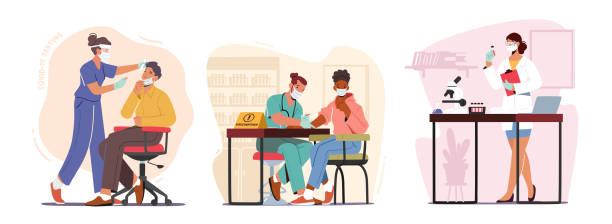Men’s Health
Men’s Health Check-up
Men’s health is an important topic that is rarely highlighted. It is normal for guys to ignore their health and delay visiting the doctor until they have significant symptoms. However, regular checkups are necessary to preserve excellent health and avoid major ailments. In this article, we’ll look at what a men’s health check entails and why it’s critical to prioritize preventative treatment.

Understanding Health Screenings and Tests
A men’s health check might include a variety of tests and screenings. These tests can help uncover potential health problems early on, allowing for more timely treatment and better results. A men’s health check may involve the following tests and screenings:
Blood Pressure and Cholesterol Checks
High blood pressure and cholesterol levels are both risk factors for heart disease, the leading cause of mortality in men. During a men’s health check, we will measure your blood pressure and cholesterol to determine your risk of heart disease. If your levels are high, we may suggest lifestyle modifications or medication to reduce your risk.
Cancer Screenings
Cancer screenings are vital for finding cancer at an early stage when it is most curable. Depending on your age and risk factors, we may recommend prostate, colon, and other cancer screenings. Physical exams, blood tests, and imaging tests may all be part of these screenings.
Diabetes and Heart Disease Assessment
Diabetes and heart disease are two prevalent health problems that can have catastrophic repercussions if not managed. During a men’s health check, we may assess your risk of these problems by examining your blood sugar levels, taking an electrocardiogram (ECG), or performing additional tests as needed.
Sexually Transmitted Diseases Testing
Sexually transmitted infections (STDs) can have major health repercussions if not addressed. During a men’s health screening, we may prescribe STD testing for HIV, syphilis, and hepatitis C. A blood test, urine test, or swab of the afflicted area may be used in the testing process.
Overall, a men’s health check is an essential aspect of staying healthy. By diagnosing potential health issues early on, we can help you stay healthy and avoid significant health problems later on.

Physical Examination Components
A physical examination is an important part of a men’s health check because it assesses the individual’s general health. This checkup entails taking multiple measures and assessing various body systems. In this section, we will go over the various components of a physical examination.
Body Measurements
We’ll start by measuring vital information like height, weight, and BMI. These measurements provide a comprehensive picture of a person’s health, and severe variations from the normal range may reveal underlying health issues.
Abdominal and Prostate Exams
Next, we’ll perform an abdominal exam to look for any anomalies, such as an abdominal aortic aneurysm. In addition, we will do a prostate exam to look for signs of prostate cancer or other prostate-related problems.
Neurological Function Evaluation
Finally, we’ll assess the individual’s neurological function. This evaluation assesses the person’s reflexes, physical strength, and coordination. Any anomalies in these locations may indicate underlying neurological issues.
To summarize, a physical examination is an essential part of a men’s health check. It provides useful information about a person’s overall health status and aids in the detection of any underlying health issues that may necessitate further research. By taking these measurements and completing these assessments, we can help assure the individual’s continuous health and well-being.

Lifestyle, Mental Health, and Family History
At a men’s health check, we examine several elements of your health. Your lifestyle, mental health, and family history are all important factors that we look into. Here’s what you may expect throughout this phase of the examination.
Diet and Exercise Habits
We will ask you about your eating and exercise habits. We want to know what you usually eat and drink, how often you exercise, and what kind of activity you undertake. Based on your responses, we can make recommendations to help you optimize your diet and exercise routine to attain peak health.
Mental Health Screening
Mental health is an important aspect of overall well-being. During the check-up, we will inquire about your mental health history and any current symptoms you may be experiencing. We may also do a mental health screening to determine your risk for depression, anxiety, or substance misuse.
Genetic Risk Factors
Your family history can reveal important information about your risk of developing certain health disorders. We’ll ask about your family’s medical history to see if there are any genetic risk factors that may affect your health. Based on your information, we may propose additional screening or testing to identify any health risks early on.
In summary, the lifestyle, mental health, and family history portions of a men’s health check are critical components of the total exam. By evaluating these aspects of your health, we may make specific suggestions to help you maintain maximum health and avoid future health issues.
Planning for Future Health
At our men’s health check, we not only assess your current health but also plan for your future health. Here are some of the ways we can help you prepare for a healthy future.
Personalized Health Strategies
We recognize that each person is unique, as are their health needs. That is why we develop personalized health regimens based on your specific needs. Our healthcare professionals will work with you to identify potential health hazards and create a plan to help you avoid them.
Vaccinations and Immunizations
Vaccinations and immunizations are critical components of sustaining good health. Our experts will review your vaccination history and prescribe any additional vaccines to protect you from preventable infections. We also advise on when to receive specific vaccines and how frequently to get them.
Healthcare and Insurance Guidance
Navigating the healthcare system may be difficult, particularly when it comes to insurance. Our experts can advise you on healthcare and insurance alternatives, allowing you to make informed decisions regarding your health and finances. We can also help you comprehend your insurance’s advantages and coverage.
By getting frequent checks, you can remain on top of your health and detect any potential problems early on. Our team is here to support and guide you as you strive for optimal health and plan for a healthy future.
Conclusion
Regular men’s health check-ups are a proactive approach to maintaining well-being. These check-ups play a pivotal role in the early detection of potential health issues, allowing for timely intervention and prevention. From cardiovascular screenings to prostate health assessments, these check-ups cover a spectrum of vital health indicators. Prioritizing regular check-ups empowers men to take control of their health, fostering longevity and a higher quality of life. Remember, preventive care is the foundation of a healthy future.


